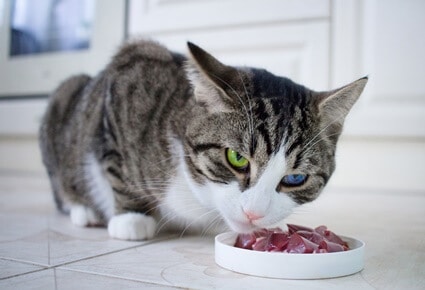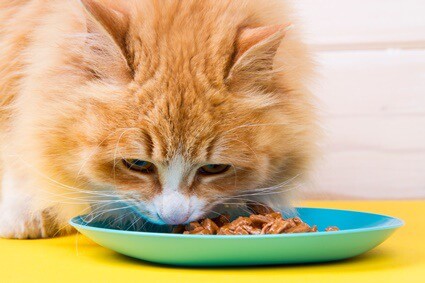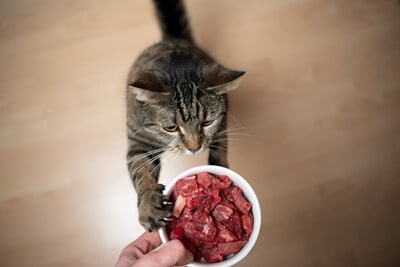Cats need a high-protein diet to thrive. However, consuming large amounts of protein can be harsh on cats with sensitive stomachs. It doesn’t help that the proteins in many commercial cat foods are low-quality and difficult to digest. To prevent digestive problems, we’re advised to feed our cats high-quality or digestible protein instead.
Cat foods that contain a single protein, such as chicken, are more digestible than meals made from rendered meat products, such as meat meal or meat by-products. That’s because more of the amino acids are retained. Also, animal proteins contain more amino acids that cats need (arginine, taurine, and lysine) than plant-based proteins.
If you feed your cat digestible protein, this will improve its bowel habits and overall health. Many chronic diseases are caused or aggravated by a low protein diet or poor quality protein.
Best Source of Protein for Cats
Cats are obligate carnivores, so they must eat animal protein to survive. Most experts agree that a meat-based diet, combined with small amounts of starch and plant-based protein, is the healthiest diet for a cat.
Animal proteins have higher biological availability than plant-based proteins. Animal flesh can provide a cat with more amino acids, vitamins, and minerals they require, so it is considered a complete food source.
Amino acids (taurine, arginine, and arachidonic acid) are not found in plant-based proteins. Also, cats are unable to convert the beta-carotene from plants into vitamin A. They must obtain preformed vitamin A from animal protein.
That’s not to say that any old meat will suffice. Digestibility is just as important as biological availability. Your cat must be able to digest the protein, or the vitamins, minerals, and amino acids will go to waste.
Why Is Protein Digestibility Important?
Dietary protein can only be beneficial to cats if it is absorbed and digested effectively. That’s why, as owners, we’re often advised to purchase cat food that contains digestible or high-quality forms of protein.
If your cat cannot digest the protein you serve up, it may become deficient in an essential nutrient. As mentioned, arginine deficiency can develop in a matter of hours if the cat hasn’t absorbed enough of this vital amino acid. You should opt for pet food with a dry matter digestibility of at least 80% to promote good health.
Unfortunately, pet food companies are not obliged to put digestibility information on the label. However, they will have tested digestibility when developing the product. If you look carefully, you might find the digestibility percentage on the manufacturer’s website.
Also, you can take a look at the ingredients list to get a rough idea of how digestible the food will be. Here are the digestibility ratings for the following cat food ingredients:
- Cooked egg whites – 98%
- Muscle meat (chicken, rabbit, turkey) – 92%
- Organ meats (kidney, liver, heart) – 90%
- Fish – 75%
- Soy – 75%
- Corn – 54%
Animal-based proteins are more digestible than plant-based proteins. However, it’s not enough to feed your cat a cooked egg or muscle meat. Balance the macronutrients (fat, carbohydrate, protein) in your cat’s diet to promote good digestive health. It’s more difficult for cats to digest carbs.
What Affects Protein Digestion in Cats?
If you want your cat to digest protein efficiently, you should consider the following factors:
- The quality of the meat in your chosen cat food, especially how the meat was processed.
- The number of meats being used in one cat food. Too much variety can overwhelm a cat’s sensitive stomach.
- The protein content of the meal along with the balance of other macronutrients.
- Whether the meat in your cat’s food mimics its natural prey. Could it catch this type of prey in real life?
- Your cat’s gut health. This can be influenced by other dietary ingredients, such as fiber and pre/probiotics.
- The age and health status of your cat. Felines have different protein requirements throughout their lifespan.
What Are the Signs of Poor Digestion in Cats?
If your cat uses its litter box once every couple of days and its poop is reasonably firm, this indicates good digestive health. On the flip side, if your cat is struggling to digest its meals, you may notice these symptoms:
- Larger stools than normal
- Poop is smellier than usual
- Loose stools
- Pooping more than once a day
- Flatulence and bloating
- A dull coat
- Lethargy
- A reluctance to eat the food provided
- Weight loss
- Diarrhea
If these symptoms continue for more than 24-48 hours, you should introduce a more digestible cat food. If symptoms such as diarrhea and vomiting persist for over 24 hours, you should contact your vet.
Which Types of Cat Food Contain High-Quality Protein?
Most pet websites will advise you to feed your cat high-quality protein because it’s easier to digest. But what is meant by high-quality protein? Identifiable muscle meat/organ parts are considered high-quality proteins. These should be listed first on the ingredients list.
Look for labels that contain chicken, lamb, rabbit, pig’s heart, pig’s liver, etc., at the top of the ingredients list instead of meat meal or by-products. Studies have shown that muscle meats and organs are highly digestible forms of protein for cats.
Studies have shown that eating a single, non-rendered protein, instead of meat meal or meat byproduct meal, enables cats to absorb more of the amino acid lysine and perhaps also more vitamin A, D, & E. So, look for cat food that contains meat/organs from a single, identifiable source at the top of the ingredients list.
Is Meat Meal Digestible for My Cat?
If you see meat meal written on the ingredients label, this means that the protein has been rendered. Rendering involves heating the animal flesh to a very high temperature to remove excess moisture and fat, thereby creating a concentrated protein form.
In some ways, this is good because it makes the product more cost-effective and easy to transport. However, it’s thought that meat meal is not as digestible as untreated meat. According to OUP, the rendering process can damage the integrity of lysine.
The evidence is sparse, so we can’t be sure if the rendering process negatively impacts amino acids. However, some scientists believe many more amino acids will be affected. Also, meat and bone meal should be avoided because high levels of bone can prevent the absorption of amino acids.
The other issue with meat meal is that it doesn’t specify which animal(s) the meat has come from. Meat meal could contain the meat of many different mammals, not just chickens, cattle, sheep, pigs, and goats.
Though variety might seem like a good thing from a nutritional perspective, research indicates that feeding your cat too many different proteins can cause digestive issues. If you want to be sure about where the animal protein has come from, look for labels where the meat is specified, i.e., chicken meal or lamb meal.

Are Meat Byproducts Safe for My Cat?
You don’t know which animal your cat is consuming. If your cat has a sensitive stomach and then has a reaction to a particular food, it won’t be possible to know what caused the reaction.
According to AAFCO, by-products include but are not limited to lungs, spleen, kidneys, brain, livers, blood, bone, partially defatted low-temperature fatty tissue, and stomachs and intestines freed of their contents. In the case of poultry, it also includes heads, feet, and entrails.
Some argue that animal fur/hair, fecal matter, plastics, and other unpalatable ingredients are present in meat by-products because it’s too costly or time-consuming for manufacturers to remove these parts.
At this time, there’s little evidence to suggest that by-products are genuinely unsafe for cats. However, meat by-products probably aren’t as digestible as premium proteins, partly because they need to be rendered to be safe for cats to consume. Consequently, it’s best to avoid this ingredient.
Which Type of Meat Is Best for Cats?
Unprocessed, whole meat is more digestible than meat meal or by-products, but which animal flesh is the best protein source for cats? Some feline nutrition experts have said that feeding a cat an animal they could reasonably catch in the wild is most beneficial. This would include:
- Chicken
- Turkey
- Rabbit
- Fish. According to Nottingham University, fish can contain high levels of arsenic, so it should only be consumed once or twice a week.
Lamb is commonly used in cat food. Several studies, including this one from NCBI, have shown that lamb is poorly digested compared to other meats. The amino acids cysteine, lysine, and threonine are absorbed less efficiently from lamb meal, perhaps because the wool is not adequately separated from the protein.
Beef is commonly used in cat food because it is a cheap form of protein. When a cat has a food intolerance or food allergy, vets often suggest eliminating beef. Many hypoallergenic cat foods don’t contain any beef.
Wet vs. Dry Food for Cats
Digestibility is often higher in wet cat food compared to dry cat food. This is because wet food goes through fewer processing stages, so the amino acids may be more intact.
Dry food (containing a meat meal) has gone through a double-processing – once when the meat was rendered and again when the mixture was made into kibble. As mentioned, the high processing temperatures can degrade lysine and other amino acids.
If you want to increase your cat’s intake of protein, you might wonder if it’s best to feed your cat wet food or dry food (kibble). If you compare two packets, it will probably seem like dry food has more protein than wet food. However, this is misleading because you cannot directly compare the two labels without performing extra calculations.
The FDA shows you how to compare the protein content of wet and dry food on a dry feed basis. Wet food contains more protein than dry food once you take the moisture content into account.
That’s not to say that dry food is all bad. Kibble may keep your cat’s teeth healthy, and it adds variety to your cat’s diet. Most vets would recommend feeding cats a combination of wet and dry food to stay healthy.
Is Raw Cat Food More Digestible?
If unprocessed meat is better for cats than meat meal, does this mean that an uncooked diet would be optimal? Wild cats eat a raw diet, so it seems like the most natural option to feed your pet.
According to Sage, a raw meat diet is highly digestible for cats. Many owners also claim that their cat’s poop is less smelly on a raw diet. Though raw food is digestible for cats, there are risks:
- Raw meat diets have been linked to fat deficiencies (total fat and essential fatty acids)
- The risk of bacterial infections increases
If you plan to feed your cat a raw diet, choose a reputable pet food manufacturer. Raw meals must be nutritionally balanced and prepared safely, so select a seller you can trust.
How Much Protein Do Cats Need?
Protein requirements change over the lifespan of a cat. Here are the recommended allowances for crude protein:
| Kitten | 10g |
| Adult Cat | 12.5g |
| Nursing Cat | 41g |
The AAFCO set the minimum level of crude protein at 26% for cat food labeled complete. However, most vets consider a high-quality cat food to contain 40-50% protein. This is closer to the amount of protein a wild cat would consume.
It was previously believed that older cats (10 years+) should not be fed protein because their bodies struggle to digest it. However, it’s now known that older cats do require protein, but that it needs to be in a very digestible form so that their bodies can tolerate it more easily.

Plant-Based Protein vs. Meat Protein
Cats require 11 essential amino acids and several other vitamins and minerals to survive. Plant-based proteins can provide some, but not all, of these amino acids, vitamins, and minerals. To be specific, the following amino acids, vitamins, and minerals can only be obtained from animal flesh or synthetic supplements:
- Preformed Vitamin A. Cats can’t convert beta-carotene into vitamins.
- Arachidonic Acid. Cats can’t convert linoleic acid into arachidonic acid
- Taurine
- Arginine
Many cat foods contain small amounts of plant-based protein/carbohydrates. If cooked properly, these are considered to be healthy in moderation.
Can Cats Eat a Vegetarian or Vegan Diet?
Most specialists would say that a purely vegetarian or vegan diet is unacceptable for cats. However, a small number of vets, scientists, and pet food manufacturers are in favor of a veggie diet for domestic cats. According to MDPI, feeding cats a plant-based diet could be an option:
- Cats need nutrients, not protein per se. We can synthetically produce the amino acids/vitamins/minerals only available from meat and add these to plant proteins. Synthetic taurine is added to most meat-based cat foods to ensure the AAFCO requirements are met.
- Food technology is advancing rapidly. Although veggie pet foods are expensive, it’s thought that they will become much more cost-effective than conventional meat-based pet foods in the long term.
- Although poorly-managed vegetarian diets can cause health problems for cats, including blindness and heart failure, studies show that a responsibly managed vegetarian diet (i.e. specially formulated cat food that sticks to AAFCO nutritional guidelines) is no less healthy than a conventional diet.
- Plant-based proteins can be digestible, if prepared correctly.
According to this review, you should only consider a vegetarian diet for your cat if you are willing to purchase a complete, nutritionally balanced veggie cat food and check the PH of your cat’s urine on a semi-regular basis.


Best article I’ve read ever regarding cats and food!
This is the most informative, easily understood article I’ve ever read on the topic. Thank you!
What is urgently needed is strict control over what goes into pet food which is not happening in order to stop companies putting all the rubbish they like into pet food, which is causing the rise in pet illness. The Gov is making millions out of our pets and therefore is not interested in their welfare only in the profit they make.